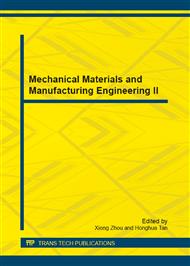p.391
p.395
p.402
p.408
p.413
p.422
p.426
p.433
p.438
Research on the Methods to Reduce the Energy Consumption of Ammonia Refrigeration System
Abstract:
In order to solve much energy waste of the ammonia refrigeration system, we analyze many parameters and processes in depth theoretical methods, experimental verification and numerical simulation in actual working condition. The results show that improve suction pressure and reduce exhaust pressure can reduce energy consumption of the system. The value of suction pressure and exhaust pressure is the optimal value when corresponding superheat degree and super cooling degree are 1°C. Control the pressure difference between inlet and outlet of compressor by increasing the exhaust pressure; the system is more stable and less energy loss. Take advantage of bypass channel to control the superheat degree is more effect than by evaporator itself. The air volume of condenser fans should adjust with its load and the outdoor dryness temperature. When the ratio approaches to the load one, the total energy consumption decreased obviously.
Info:
Periodical:
Pages:
413-421
DOI:
Citation:
Online since:
December 2012
Authors:
Keywords:
Price:
Сopyright:
© 2013 Trans Tech Publications Ltd. All Rights Reserved
Share:
Citation:


